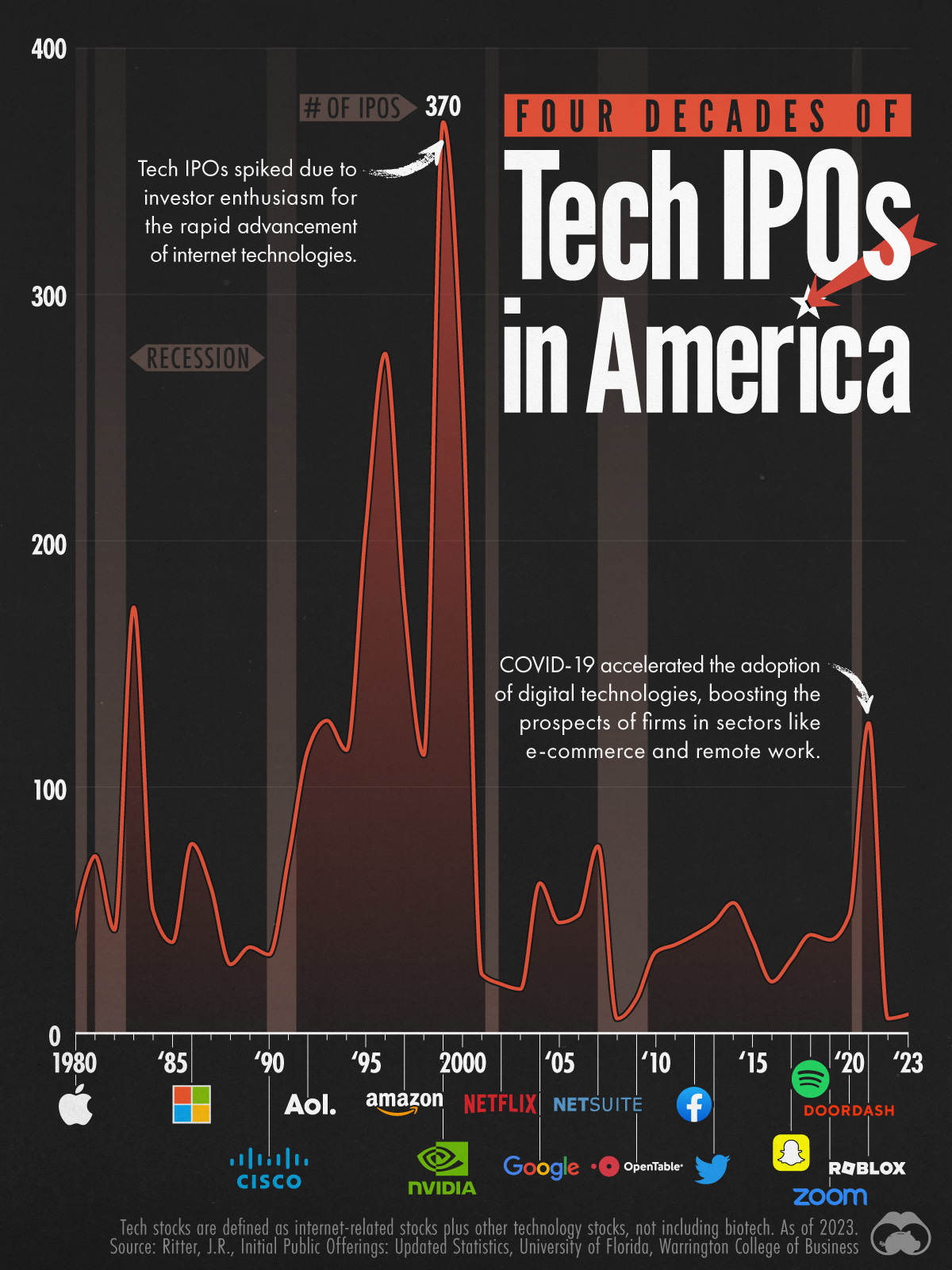Contrary Research Rundown #130
Is the US tech IPO revival over before it even began? Plus new memos on Shield AI, Solugen, and more
Designers, start your Config week in SF at Pixel Punch, a curated event of design lightning talks and drinks with senior design leads from Ramp, Windsurf, and Numeric.
Join us on May 6th: https://lu.ma/PixelPunch2025
Research Rundown
The Trump administration’s tariff announcements on Wednesday are highly consequential and have been analyzed from every possible angle. But as the dust begins to settle, attention is turning to the potential second-order effects that this week’s events could have on the tech industry.
Just one week ago, when we wrote about CoreWeave’s IPO last Friday, it seemed like the tech IPO market was poised for a revival. In the month of March alone, three multi-billion-dollar tech companies filed to go public: Hinge Health, Klarna, and StubHub. But within a few days after new tariffs were announced, two of the three (Klarna and StubHub) had reportedly already “delayed” their plans to go public.
After a week that saw the Nasdaq drop by over 10%, its steepest drop since COVID-19 lockdowns began in March 2020, it’s not a mystery why these companies have chosen to delay their IPOs. But it’s an ominous sign for the tech industry, which was just starting to recover after a period of depressed activity.

After a frenzy of IPOs in 2021, which saw 126 US tech companies go public, numbers declined into the single digits from 2022 to 2024. Compared to the 2010s, which saw an average of about 35 US tech IPOs per year, this was a substantial drop off — and one with profound liquidity consequences for private tech companies and their investors.
Although mechanisms for private liquidity like secondary markets saw a corresponding growth in transaction volume over the same period that IPOs were depressed, ultimately lack of access to public markets cuts off an important source of capital for companies themselves, and creates friction for early investors and employees of companies who often look forward to liquidity events such as IPOs or acquisitions to cash in on years of patience.

This, in turn, changes the risk/reward calculus of founding, investing, or working at early-stage tech companies. One of the many important downstream effects of the US’s tariff policy, if it continues to create either lasting uncertainty or leads to a protracted decline in public markets, could be an ongoing US tech IPO winter. It’s an open question if that how long that outcome would cause Klarna and StubHub to postpone their IPOs, or whether they would cancel them entirely and decide to stay private.
Such an outcome would also lead to a slowdown in startup funding at the exact time when the startup ecosystem is undergoing what may well turn out to be its biggest transformative moment since the invention of the iPhone, and when the AI arms race between China and the US seems destined to reach a critical point by the end of the decade.
Shield AI is a defense technology company that builds AI systems, starting with fully autonomous quadcopters that collect data in dangerous environments and protect military personnel and civilians. To learn more, read our full memo here and check out some open roles below:
Senior Project Engineer - Dallas, TX
Senior Engineer, Software Autonomy - Dallas, TX
By combining enzyme engineering, metal catalysis, and AI, Solugen has developed a modular manufacturing platform that produces high-performance chemicals from renewable feedstocks, at an industrial scale, and with carbon-negative economics. To learn more, read our full memo here and check out some open roles below:
Apply for future opportunities here
Airbyte offers an open-source data integration platform with a suite of pre-built connectors, allowing users to sync data from over 550 sources and applications. To learn more, read our full memo here and check out some open roles below:
Engineering Manager, Database Sources - San Francisco, CA
Product Manager, Data Activation - San Francisco, CA
Check out some standout roles from this week.
Launch Darkly | Remote (US) Backend Engineer (AI), Frontend Engineer (Experimentation), Fullstack Engineer (Error Monitoring), GTM Lead (Experimentation), Principal Product Manager (AI)
Front | San Francisco, CA - Senior Frontend Engineer (Client Platform), Senior Full Stack Engineer (Telephony), Product Designer (Dev Platform), Head of Data
Runway | Remote (US) Director of Machine Learning (Dataset Engineering), Engineering Manager (Frontend), Engineering Manager (Machine Learning)
Attentive | Remote (US) Engineering Manager (Production Engineering), Infrastructure Engineer II, Senior Data Engineer (Machine Learning Platform), Senior Infrastructure Engineer
Midjourney has released its first new model in nearly a year, called V7, which features improved text prompts, image quality, and coherence.
OpenAI has closed a record-breaking $40 billion funding round, the largest private tech deal ever, valuing the company at $300 billion.
The train station building in Arida, Wakayama Prefecture is the world's first to be built using 3D printer technology, according to West Japan Railway (JR West).
Nelson Reed writes about how corporations have capitalized on the negative perception of boredom, framing it as an individual problem that can be solved through consumerism, in order to maintain existing power structures and manipulate consumers.
This article examines the profit margins and valuation of the $2 billion AI talent marketplace startup Mercor, which has recently reached $100 million in ARR.
The White House and Commerce department officials have been pressing TSMC and Intel to strike a deal to form a joint venture to operate the U.S. chipmaker's factories.
AI 2027 details the scenario about the rapid development of superintelligent AI systems and their transformative impact on the world by 2027.
Plaid raised $575 million in a common stock sale at a $6.1 billion valuation, while stating it will not go public in 2025.
Circle, a stablecoin provider, filed publicly for an IPO and showing steadily increasing revenue — the company reported net income of $156 million on revenue of $1.68 billion in 2024, up from $268 million on $1.45 billion in revenue the previous year.
The affidavit of the Rippling employee, who testified he was working as a spy for Deel, describes a corporate espionage scheme where he was paid €5K per month by Deel to spy on Rippling and share sensitive information like sales leads, product roadmaps, and customer accounts.
MIT researchers developed a framework that uses large language models to break down complex planning problems and automatically solve them using optimization solvers, achieving an 85% success rate compared to 39% for baseline methods.
Northwestern engineers have developed the world's smallest pacemaker that can be non-invasively injected into the body and is activated by light to control irregular heartbeats.
Lightmatter, a photonics startup valued at $4.4 billion, has released new photonics technology aimed at speeding up the connections between artificial intelligence chips by using optical connections instead of electrical signals.
Adaptive Security has raised $43 million in funding led by a16z and the OpenAI fund — this is OpenAI's first cyber security investment.
Fastino, a new foundation AI model provider, has launched with $7 million pre-seed funding to offer task-optimized language models that are 1000x faster than leading models and do not require GPUs.
Amazon unveiled Nova Act, an AI agent that can control a web browser and perform simple actions on behalf of users, as part of its efforts to develop more capable AI agents.
Wing Venture Capital published its 2025 Enterprise Tech 30 report, which identifies the most promising private companies in enterprise technology, with a focus on AI-native apps, agentic systems, and rising early-stage momentum.
Zane Hengsperger believes that in 25 years, we will realize that we have misallocated time, talent, and capital by focusing on solving "lazy problems" like food delivery while US steel production has dropped 34% and the country has lost 5.8 million manufacturing jobs.
Runway is introducing Gen-4, a new series of state-of-the-art AI models for media generation and world consistency that represent a significant step forward in fidelity, dynamic motion, and controllability in generative media.
Figure has released a new video of its humanoid robot working on a BMW production line, which is not just a test environment but real production operations.
Etched, a new AI chip startup, has reportedly closed an unannounced $85 million funding round at a $1.5 billion valuation, following two previous stealth rounds at $500 million and $750 million.
At Contrary Research, we’ve built the best starting place to understand private tech companies. We can't do it alone, nor would we want to. We focus on bringing together a variety of different perspectives.
That's why applications are open for our Research Fellowship. In the past, we've worked with software engineers, product managers, investors, and more. If you're interested in researching and writing about tech companies, apply here!












